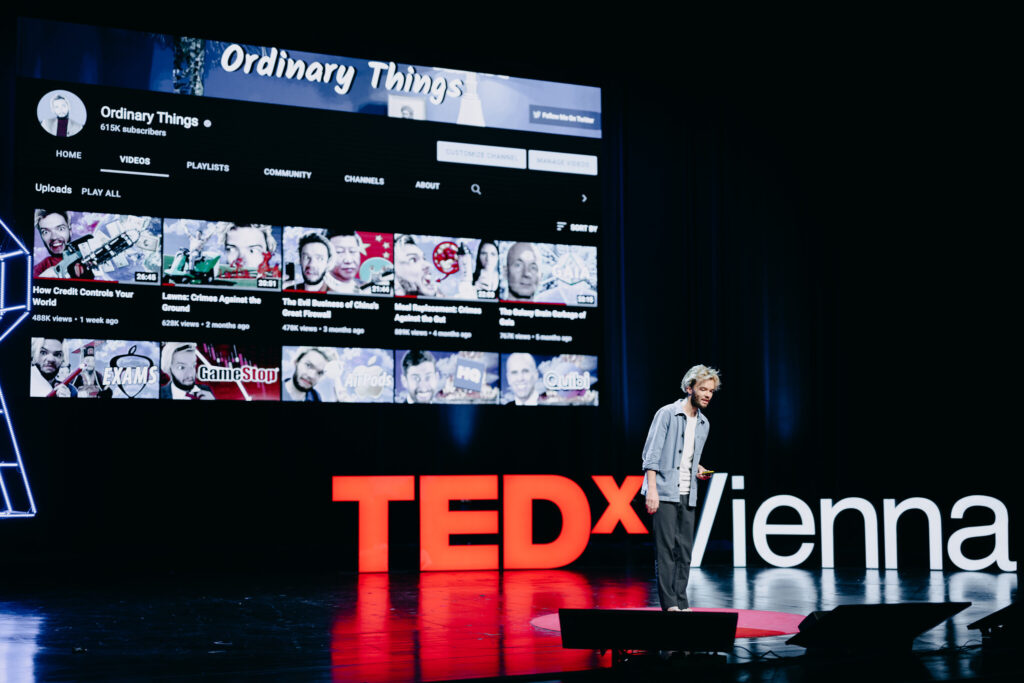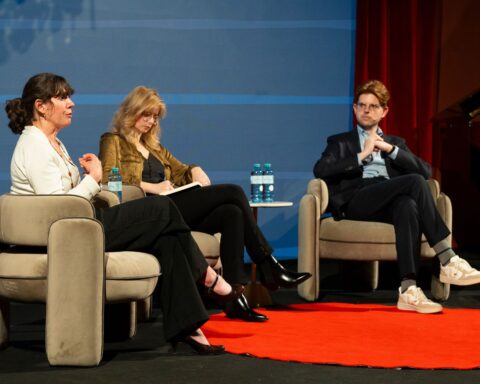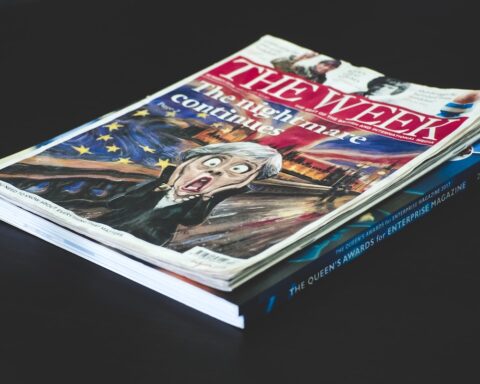Ordinary Things is a satirist who documents and makes videos about the factual sometimes dark tales behind day-to-day things for over 600,000 (and counting) subscribers on YouTube since the channel started in 2019. Some of the memorable topics he has discussed include algorithms, China’s Great Firewall, the financial guru’s “How to become a millionaire” get-rich schemes, the evil businesses of Tinder, onions, coffee, breakfast cereal, cruise ships, fedoras, you name it.
In his talk at TEDxVienna 2021 UNTOLD, Ordinary Things shared his experiences and insights on the global culture and impact of the internet, the current twin moods of the internet being tragic and absurd, internet sovereignty in countries such as China, and the internet being used to organize civil rights protests such as the 2011 Tahrir Square demonstrations in Cairo. He also made a crucial point about the decentralization of mass organizations, as well as the testing of boundaries of free speech with mis- and dis- information. He propelled the audience to think about how the internet would look like in 50 years, and urged internet users and news consumers to always keep an open, inquiring and suspicious mind.
After the enlightening talk, I had the pleasure to catch up with the face behind Ordinary Things, who despite the lack of a formal moniker, is just as warm and delightful as any ordinary folk you meet. In our interview, we talked about anonymity and credibility being a public figure, media biases, other satirists, and the endearing sriracha sauce.
Given the tragic and absurd duality of the current state of the internet, you mentioned earlier, that the way to go is to decentralize mass organizations. Would you like to elaborate on how this can be done?
First, the boring part of the solution is, the infrastructure itself needs to be decentralized. Data centers, even hyperscale data centers can be owned by private individuals, but more importantly it’s the internet exchange points. They are securely guarded buildings mostly owned by state and academic institutions, but the more you have it banned, the better and the harder it is to control them. In developing countries it often lacks only one or two and therefore it’s easier to control, but if academic institutions in developing countries make their own exchange points, then it becomes a lot harder to control the internet from a central body. We don’t think about the internet in physical terms very often for good reasons, but I think that’s above that, it’s making sure the infrastructure is owned by as many people as possible. And attempts of the United Nations (UN) to control would also be good but that’s more macro, and certainly out of the power of most individuals I think.

I’m sure a lot of people are curious about the face behind Ordinary Things. To what extent do you go to remain anonymous? And how long do you think you can retain this anonymity given that you are a public figure?
If I remained on the platform I’m on, I think I could probably retain it for a while. But once you start engaging with legacy media, like newspapers, it becomes harder and harder because they need your legal name for all sorts of reasons. If you just stay a YouTuber and a content creator on the platform, I think you can retain it for a while. Someone might suss you out if they are investigative. But I think my audience is the kind of people who might know my work and are generally not interested in my name, they are interested in who I am. I think what’s quite interesting is, I’ve made maybe 150 videos now, and they know me quite well, my character probably, and my ideas about things. It does challenge the notion of anonymity. I think I can retain it online, but if there was ever any mainstream media interested in me, then I’d be in trouble. But I also don’t mind, I’m not precious about my anonymity, I just want to retain it for the sport of it.
The artist Banksy is anonymous and his art is also very much about ordinary things told in a simple way. Do you see any parallels between Banksy and Ordinary Things?
I think we’re both quite anti-establishment, but I think that might be where it ends. Banksy is a lot more talented than me, and richer too. I do think about that. I mean, there are many anonymous YouTubers who generally don’t show their face, and hide behind an avatar, and they become more of a character; Whereas I can’t really hide behind a character, because my face is there. Certainly not by the standard of half the creators, Banksy as well. Banksy has no face as far as some people know. But if you really look it up, you can find out who Banksy is.
Do you think anonymity and one’s credibility are mutually exclusive?
They are not mutually exclusive, but I think anonymity gives you a degree of anti-establishment credentials, but with credibility you can only get so credible while being anonymous. If you want true credibility you do need to reveal yourself in a way because if you gained a lot of public attention, it is responsible that you have to be named. But I don’t want to be credible ultimately, I want to be able to stay an outsider because that allows me to criticize and be a bit pensive in a way that I intend to continue to be. You know, they got your name and you can be held accountable for a lot of things.
Like Alexei Navalny whom you mentioned in your talk?
He is a YouTuber who has talked against the government, talking against the government of his own country that’s known to suppress dissidents. That stuff is much different, but I’m aware of that. There’s no danger to me now or has been presented, but I’m preparing for the future whether or not that might or might not be the case.

You have exposed many “dark tales” in some of the topics you discussed on your YouTube channel. As far as you know, have you offended any people or organizations? Is there anyone on your tail?
I’m not sure if anyone’s on my tail. I’ve been told the people at Tinder HQ are not happy with the video I put out, which is a Badge of Honour. I’m happy about that. But other than that, not really. I think I’m quite lucky on YouTube, the comments are pretty nice, no one’s too bothered about what I said yet.
We are inundated by a plethora of news sources day in, day out. How should we stay inquiring and suspicious in order to not fall prey to mis- and dis- information?
Certainly interrogate any source you read, and make sure it is reliable and fact checked. There are traps that even intelligent people fall into, like opinion pieces, certain types of opinion writing and fact-based investigations. It’s amazing how much there is especially in the British press. Outrageous opinion journalism gets so much more attention, gets paid well compared to fact-based on-the-ground journalism – that if you care about information, you need to champion that kind of work – fact-based information. Anything that’s trying to boil your blood, anything that’s trying to make you feel before making sure you are informed is dangerous. Read things that are in principle opposed to your worldview, that’s important. I try to do that. Read economics.
Like Morning Brew bite-size (business) news which you mentioned in one of your videos?
They are a good company, very fact-based, they don’t have a political agenda. I respect that.
“Fighting bias is a personal responsibility, not a societal one.”
Satirist Ordinary Things
Do you think news sources can be totally unbiased?
No, that’s impossible. Everything is biased. Just by what you choose to talk about and what you don’t choose to talk about, that is bias. I think the only way to fight bias is to find it within yourself. You can’t expect someone else to provide you with unbiased information. You just have to question your own biases. Fighting bias is a personal responsibility, not a societal one, in my opinion.
It is (fighting bias) an internal struggle sometimes, isn’t it?
Oh, it’s hard. When there’s a cultural war which tells you that every piece of information you consume is either this side or that side, that’s where it’s dangerous.
You do have great responsibilities as a public figure because you are providing information to your audience, how do you choose your topics and how do you check your sources?
I would ask if this topic is relevant to most people’s lives, to my subscribers’ lives, that’s why I judge it being ordinary. For instance, a dating app – pretty much everyone has used it or is aware of it. Or credit cards – pretty much everyone has been offered one. That’s pretty important, if it is relevant to the life of the reader or viewer, if it’s not, then I’m afraid it’s not interesting. The process of fact-checking after you’ve finished the script takes a couple of days, to make sure you’re not going too wrong. Sometimes you might mess up a little bit there, and sometimes you’ve got to put the corrections at the bottom of the video. The comments section will also be the first to tell you that you got something wrong, if that happens, well you’ve got to eat a humble pie and post the corrections.
You have a great sense of humor! How do you find that energy in keeping your audience entertained and enticed video after video?
It’s very important to me that everything is entertaining, and I think if 30 seconds have passed and there’s not been a joke, you’d better have a good reason for it, that’s how I feel. You got to be really hammering home some information that’s important that needs to be understood. If there isn’t one… well I don’t know, I like to make people laugh.

Is there anyone who has had an influence on this humorous side of you?
Yes, Charlie Brooker, Chris Morris, and Jon Stewart. I grew up with all those three guys. It’s unusual for a Brit, especially for Jon Stewart who was only available at a certain time. But I love them. They talk about politics, and nihilistic in a little bit, horrific by what’s going on but also amused at the same time, that kind of humor. That’s the way to get through it. With comedy, you can’t be too empathetic. Everything is more fun with a bit of a joke, isn’t it?
Do you have any plans for your YouTube channel in the future?
There’ll be a comic book coming and it’ll be on my channel. There’ll be industry artists from big companies, I can’t say who yet. But I’ve been writing a comic book, and I’m pretty excited about it, it should be coming out next year (2022).
Last but not least, please complete this sentence: “A mind-blowing gastronomical experience would be sriracha sauce with…”
Everything. It’s a boring answer, but I think sriracha and eggs just can’t go wrong. I’d like to have that every morning. Scrambled, fried, whichever, I think it goes with all. Sriracha sauce is the most versatile sauce in the world, I think it’s priceless. (Thank you for the gourmet tip, Ordinary Things!)
Stay tuned for the video of Ordinary Things’ full talk at TEDxVienna UNTOLD, to be posted here soon!
To watch Ordinary Things discuss more everyday topics, subscribe to his YouTube channel, follow him on Twitter, or join him on Patreon.





